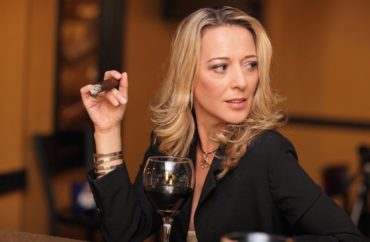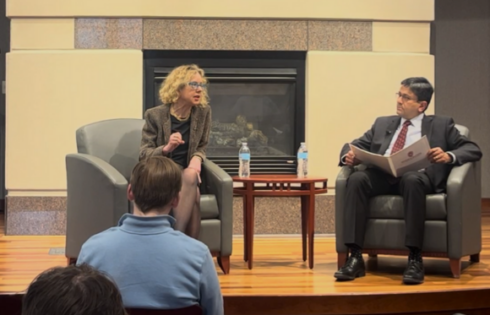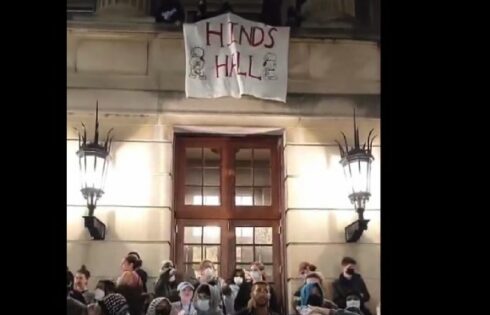
Christian school hid evidence from accused professor, he says
Baylor University created a campus-wide “culture of anti-male bias and intimidation” in response to criticism about its handling of sexual-assault reports, according to a federal lawsuit filed last week.
“John Doe,” a former assistant professor of economics, not only claims that the Christian university ignored evidence that contradicted his student accuser, a former lover. He says female professors are tacitly allowed to date students in violation of school policies, to the point where some have married their male students.
The “biased and flawed” Title IX investigation, in which Baylor refused to give him a “language accommodation,” stemmed from pressure the school faced between 2015 and 2016 to clamp down on alleged sexual assault by student athletes.
John resigned from Baylor in 2018 after it found him responsible for sexual assault and intimate partner violence against the undergraduate student, which he denied. He hasn’t been able to find “another professorship” since. (The suit makes no mention that he ever taught her.)
He’s suing for violations of Title IX under the “erroneous outcome” theory, which says a false finding stemmed from gender bias, and state and federal employment laws. John also alleges breach of contract.
A 2016 report from law firm Pepper Hamilton found that Baylor “minimized Title IX enforcement” and “impeded” sexual assault complaints involving student athletes. The U.S. Department of Education’s Office for Civil Rights has been investigating Baylor for nearly three years for the same reason.
Baylor removed Kenneth Starr as president and fired football coach Art Briles (below) following these reports. Some feared an overcorrection against males at Baylor due to the campus climate, an argument advanced by John.
John’s attorney didn’t return an email from The College Fix. Baylor denied John’s claims in an email statement.
“Baylor University will vigorously defend the inaccurate claims made by the Plaintiff in this lawsuit,” wrote Lori Fogleman, assistant vice president of media and public relations:
Following an investigation by Baylor’s Title IX Office, the Plaintiff was found responsible for, among other things, violating Baylor’s policy prohibiting non-consensual sexual contact with a student. The Plaintiff also violated University policy that prohibits romantic and/or sexual relationships between faculty members and undergraduate students. The Plaintiff resigned from the University prior to the completion of the Title IX process, which ultimately resulted in a finding that the Plaintiff violated Baylor’s Title IX policy.
Women can close their office doors, men can’t
John claims that his superiors at Baylor confirmed the existence of anti-male bias and comparatively lax oversight of female professors.
When he began teaching in 2015, supervisor Scott Gardner warned John that a large Baylor flag he had hung on a transparent glass door in his office could be used to “falsely accuse” him of misconduct. John claims female professors on the floor were still allowed to cover their doors, but he was encouraged not to.
Another supervisor, Steve Green, warned him two years later to “protect himself from female students who may accuse him of misconduct,” due to the “environment” at Baylor stemming from the athletic sexual-assault scandal.
For that reason, Green allegedly counseled John to leave his office door open when conducting office hours and keep female students out after 5 p.m. If one accused him of sexual misconduct for an incident after 5 p.m., Green explained, “there would be no witnesses in the department to testify” in John’s defense.
MORE: Calls for transparency persist in Baylor Title IX scandal
Female professors were safe to ignore this protocol for male professors and leave their doors closed during office hours, he said.
John met the female student who would later file sexual-assault charges against him at her place of work in 2017. He invited her to a sporting event, then went on several dates from November to January, including “one consensual sexual interaction.” (She identified three nonconsensual encounters and three that were unprotected against her wishes.)
The lawsuit describes a rocky relationship. The couple first faced tension when the female said she wasn’t interested in marriage, like John was, ending their relationship in February 2018.
They resumed dating in April, and went on a trip to Utah together in late May. John ended the relationship soon after this because she was “lying to him,” yet let her stay with him for several days as she was between apartments. He ended the relationship again June 6.
Accuser doesn’t need ‘good evidence’ to convince Title IX adjudicators
This is when the female made allegations against him with the Baylor Title IX office, whose coordinator Laura Johnson (below) allegedly “encouraged” her to file the complaint.
Johnson had a “presumption that because she was a female and [he] was a male,” the accuser’s allegations would be “sustained,” according to a text the accuser sent her friend Matthew Cruz, a witness in the Title IX investigation.
According to the text, Johnson told the accuser that even if she “didn’t have good evidence,” the administration “wouldn’t be in the position to doubt” her. Johnson also allegedly said that her “continued co-habitation” with John after the alleged misconduct, and her statement that the first supposed sexual assault was actually consensual, would not affect her claims.
John received notice on July 2 that he was under investigation on four allegations, some with specific dates and some with date ranges, all in May. Some of the allegedly nonconsensual incidents occurred during their Utah trip, when they were dating, and when the accuser briefly lived with John between apartments, when they had broken up.
The Oct. 10 final report by Carolyn Hughes, deputy Title IX coordinator, found John responsible for all four allegations, including intimate partner violence but not nonconsensual ejaculation (“sexual exploitation”) on two of three occasions. One finding was based on an incident for which the accuser provided no details and no date, he said.
The suit claims Charles North, the chair of John’s department, told him that he was only charged “because of the anti-male bias inherent in Baylor’s Title IX system.” North allegedly told John that Hughes “is not fair” and questioned her qualifications to conduct a Title IX investigation. (Hughes came to Baylor from an even more conservative Christian university, Virginia’s Regent.)
Hughes (below) failed to comply with the Sexual and Gender-Based Harassment and Interpersonal Violence Policy, known as SGBH, by denying John timely and equal access to information that will be used in disciplinary proceedings, he claims.
MORE: Baylor sexual-assault report recommends dumping due process
The accuser received notes from John’s “intake meeting” but he didn’t receive hers despite requesting them, according to John. Baylor used her notes in the disciplinary proceedings but left them out of materials John could see – two versions of a preliminary report and the final investigative report.
Johnson ignored that the accuser had changed her story multiple times, including how many times she was assaulted, as well as the full context of the couple’s relationship, John said.
For example, the accuser moved into John’s home for nearly a week after she claims he assaulted her in Utah, and while the assaults were ongoing. She also referred to sex with John after the Utah trip as “a really sweet moment” that “was fully consensual.”
John claims that contrary to SGBH policy he was not allowed to provide exculpatory evidence. It included a “happy and smiling” photo of the accuser in Utah and home surveillance footage that shows her “freely entering and leaving” John’s house after the alleged assaults.

Invented ‘coercion’ definition out of whole cloth
Hughes went so far as to admit in the Title IX hearing that she “used her personal opinion because [she] believed” the accuser, the suit claims. The deputy Title IX coordinator had to ignore “bank statements and text messages” the accuser sent her friend Cruz that showed she lied about purchasing Plan B emergency contraception.
Without any support from the SGBH policy, Hughes also determined that the accuser’s “lack of engagement” during sex amounted to “coercion” by John.
The former professor claims he has language challenges that make it difficult to answer questions orally in English, his fourth language.
By denying his request to give John “initial intake questions in writing so that he could provide his responses in writing,” Hughes denied him equal opportunity to participate. She allegedly characterized his request as “declining to participate.”
The final insult was John receiving “dismissal procedures” before the investigation was complete, “in anticipation” of a guilty finding.
He was “constructively discharged” – choosing to resign because of a hostile work environment – two days before his Title IX hearing, which department chair North (below) was sure would lead to his firing, according to John.
MORE: Baylor students try to cancel pro-marriage talk

‘Close contact with female students’ only OK for female professors
The suit claims that the “evidentiary and procedural errors” throughout the investigation denied John due process and resulted in an erroneous outcome based on gender bias, in violation of Title IX.
Hughes “relied on her own subjective feelings” rather than the SGBH policy or “actual facts and evidence,” due to John’s gender.
John was also treated “less favorably” than “similarly situated female employees,” a violation of Title VII of the Civil Rights Act.
“Female instructors at Baylor were not subject to adverse employment actions if they had close contact with female students,” including a fellow economics professor, Cherise Bridgwater. She was allowed to “cultivate relationships” with female students and close her door during office hours, he claims.
John’s claims are more vague about female professors being permitted to date male students. He did not cite any who had married their male students, simply saying it had happened “in certain instances.”
If John’s federal statutory claims don’t hold, he’s counting on the state labor code and common-law breach of contract to hold Baylor accountable.
The university violated its contractual relationship with John by ignoring promises to him in the SGBH Policy. He cited his right to “fully participate” in the investigation, via the language accommodation, and to receive “timely and equal access” to information, namely the accuser’s intake notes.
The lawsuit seeks damages for loss of reputation and future career prospects, past and future economic losses, and attorney fees. John is also seeking an injunction to force Baylor to vacate the findings against him and expunge the records from the disciplinary process.
MORE: Baylor warns students about cultural appropriation on Halloween
IMAGES: Felix Mizioznikov/Shutterstock, Baylor screenshots
Like The College Fix on Facebook / Follow us on Twitter






Please join the conversation about our stories on Facebook, Twitter, Instagram, Reddit, MeWe, Rumble, Gab, Minds and Gettr.